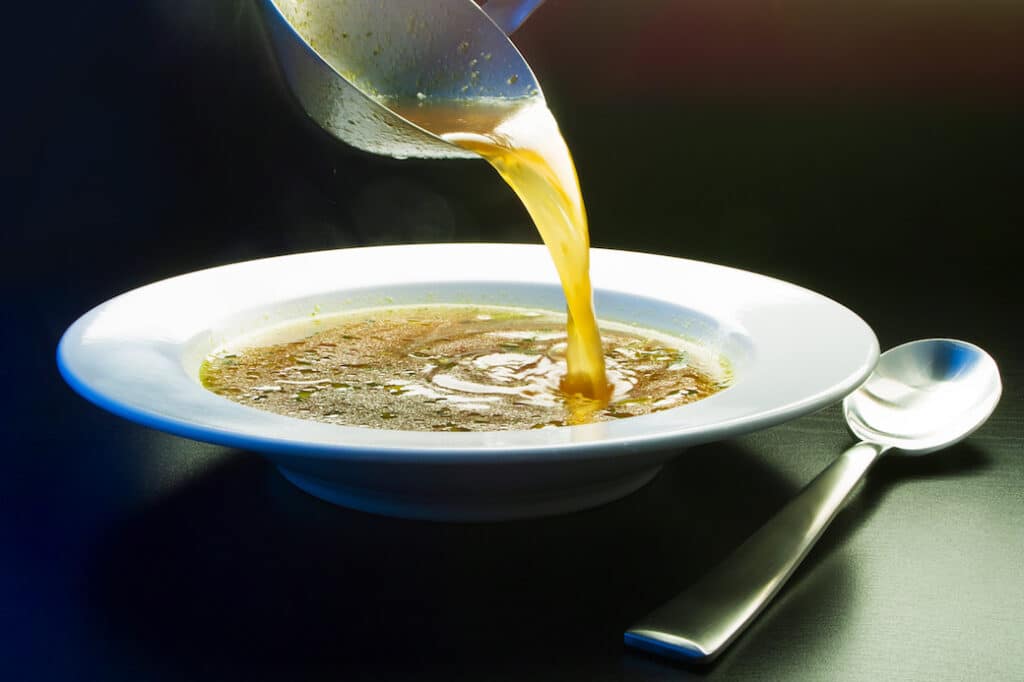Bone Broth: Super Food or Just Another Fad?

No doubt about it, bone broth is trending. Bone broth carts (a.k.a. Brodo carts) and counters are popping up all across the country to serve it, and you can find plenty of websites touting its health benefits. If you listen to the dialogue, you might think bone broth could cure everything from the common cold to cancer. But how healthy is bone broth? And are all the claims true?
The short answers to these questions are that bone broth can be very healthy and most of the claims appear to be true but with important caveats. So, what is it about bone broth that makes it so curiously healthy?
Restoring and Maintaining a Healthy Gut
The primary health benefits of bone broth can be traced to the fact that it promotes gut health, and a healthy gut impacts the health of every system and cell in the human body. Even practitioners of conventional medicine are beginning to come around to the fact that a healthy gut is a key component of a healthy immune system and that it plays an important role in optimal brain function.
And because the immune system plays a key role in fighting both colds and cancer, yes, bone broth can play a role in help to cure everything from the common cold to cancer. It’s certainly not a cure-all, but it promotes healthy body composition and function.
The health benefits of bone broth come from the many nutrients it contains, especially nutrients that promote a healthy gut, including these:
- Collagen: Although collagen is primarily associated with healthy joints and skin, its structural properties and amino acids reduce gut inflammation, improve digestion, and help to regulate the production of stomach acid.
- Gelatin: When broth is cooled, it takes on the consistency of Jell-O thanks to the gelatin it contains. This gelatin helps to restore a healthy mucosal lining in the stomach that serves as a barrier to protect the stomach from its own digestive secretions.
- Glycine: A primary component of collagen, glycine prevents inflammation throughout the body, including the gastrointestinal tract. Like gelatin, glycine can also promote healing of the stomach lining.
- Proline: Proline is one of several amino acids, including glutamine, glutamate, and arginine, methionine, cysteine and threonine that promote healthy intestinal and gut-associated lymphoid tissue (GALT), which are essential components of immune defense.
- Glutamine: Like glycine, glutamine contributes to restoring the gut’s mucosal lining and closing the tight junctions in the intestines. It also reduces intestinal inflammation.
In addition, bone broth can contain numerous vitamins and minerals, including A, B vitamins, vitamin C, vitamin D, vitamin K, calcium, magnesium, phosphorus, potassium, zinc, manganese, copper, boron, and iron. It’s not exactly packed with these vitamins and minerals, but you can make your broth even more nutritious by adding vegetables and spices. For example, adding lemon, garlic, and turmeric to chicken broth can improve the flavor while increasing its potency as an immune system booster, detoxifier, and anti-inflammatory.
Also, studies have shown that when you begin a meal with a cup or bowl of soup, you tend to consume fewer calories. That’s because of the volume soup adds to a meal — your body will feel fuller sooner, which ultimately reduces the number of calories you consume at the meal in question.
Highlighting the Many Health Benefits of Bone Broth
Due to its unique blend of nutrients, bone broth — when properly prepared — delivers a host of health benefits, including the following:
- Aids in the restoration of gut health
- Boosts the immune system
- Reduces inflammation
- Protects and heals joints
- Maintains healthy skin and hair
- Improves detoxification
- Helps to repair muscle tissue
- Regulates metabolism
If you haven’t yet jumped on the bone broth bandwagon, we encourage you to talk with us about doing so. It’s not only healthy, but it’s also tasty and easy (though time-consuming) to make, and it’s made from stuff we generally throw away — bones and cartilage. Your gastrointestinal tract will thank you, perhaps reminding you a healthy gut usually leads to a healthier, happier you.


